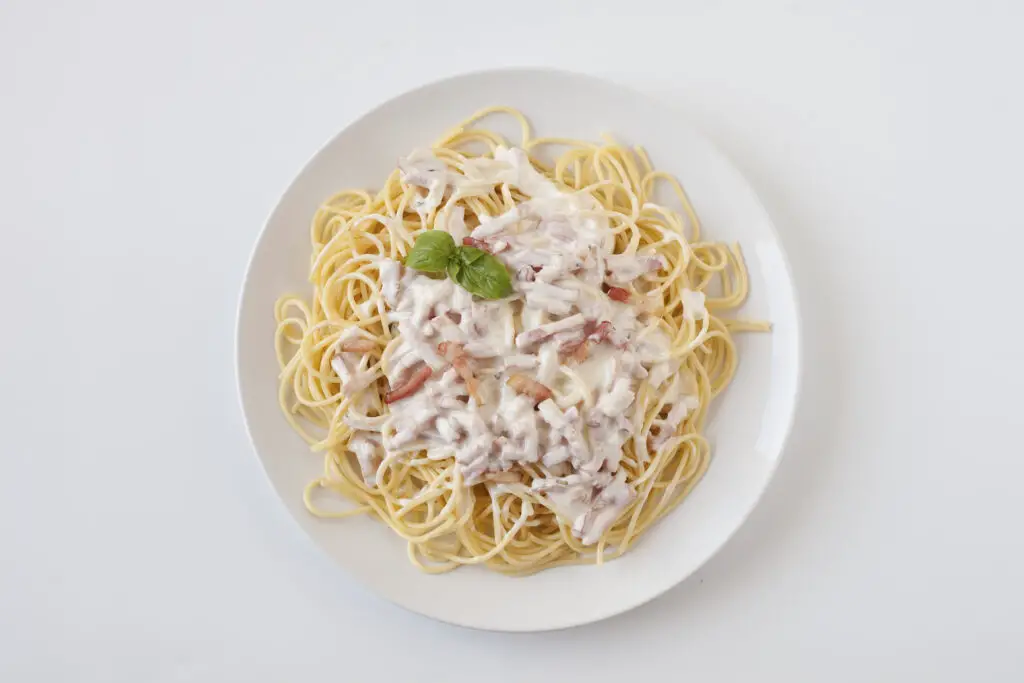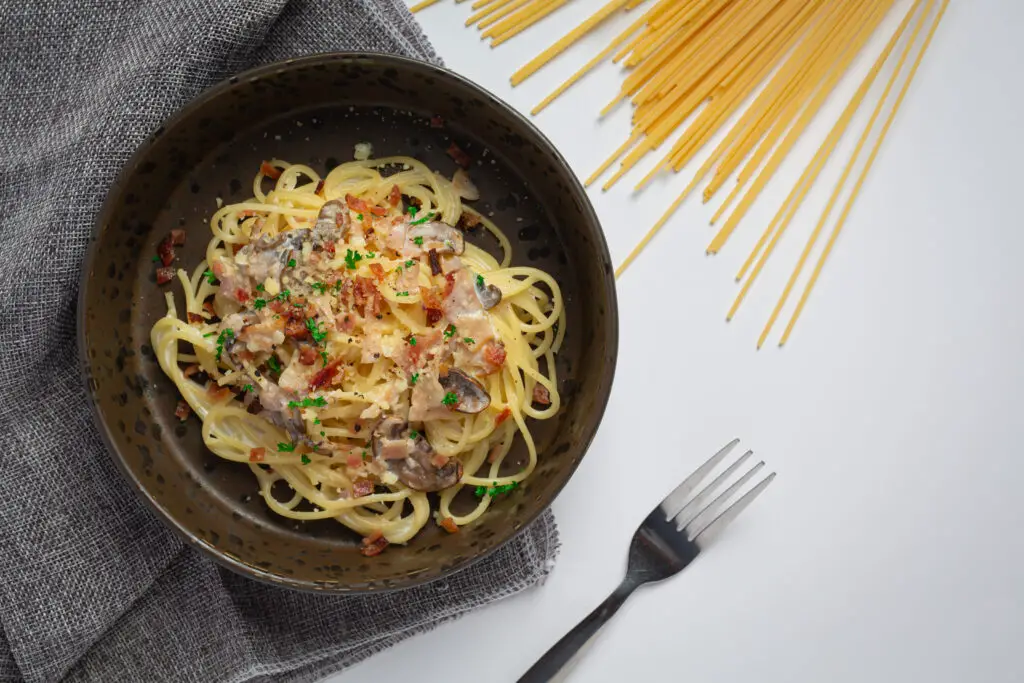Introduction
Pet owners are frequently curious as to whether their feline companions are compatible with human diets. I know of very few people who don’t love pasta, especially chicken Alfredo.
But the question is, Can cats eat Alfredo Pasta Sauce? For a variety of reasons, cats shouldn’t eat Alfredo pasta sauce, to put it briefly. First off, the majority of Alfredo’s pasta sauce is composed of cheese and heavy cream, both of which are hard for cats to digest. Second, garlic, which can be poisonous to cats in large doses, is a component of some Alfredo sauce recipes.
We now know that cats shouldn’t consume pasta sauce with Alfredo. But there are a few topics we ought to discuss in more detail. Now let’s get going!
Table of Contents
Can Cats Eat Alfredo Pasta Sauce? Is It Okay For Cats?

Image credit of Freepik
Now, let’s explore the world of cat food and consider this intriguing query: “Can Cats Eat Alfredo Pasta Sauce? “Are cats able to use it?” You’re probably thinking that with its creaminess and cheese, Alfredo sauce would be a delicious treat for our furry friends.
First of all, think of cats as tiny, hungry lions lurking around your living room. They do well on a diet high in meat. Now, Alfredo sauce isn’t exactly what you’d find in a wild cat’s diet because of its high dairy content. Cheese-based? Not exactly to their taste. Cats frequently lack the enzyme necessary to properly digest dairy products because they are lactose intolerant. Giving them Alfredo sauce could cause some very unpleasant digestive problems, such as severe flatulence and diarrhoea.
But there’s still more. Creamy Alfredo sauce is a veritable fat bomb, full of cheese, butter, and occasionally bacon. Who doesn’t enjoy being a little fat now?
Cats do, too, but only occasionally. If a cat has too much fat, it may be overweight and unhealthy, increasing the risk of obesity, heart disease, and even pancreatitis. Furthermore, although a tubby tabby may seem adorable, it’s not a picture of health.
Furthermore, Alfredo sauce contains a lot of salt, which is bad for our feline companions. Cats do require salt, but only very little. Sodium poisoning, which manifests as excessive thirst, dehydration, and even seizures, can be caused by eating too much salt.
Not to mention the garlic that’s frequently added to Alfredo sauce. Garlic, onions, and leeks are members of the Allium family, which is strongly discouraged for cats. These may harm their red blood cells, which could result in anaemia.
What is the conclusion, then? Is it appropriate to let your furry friend dig into a bowl of Alfredo sauce? The answer is without a doubt “no.” A cat’s nutritional requirements don’t quite fit the human delicacy of Alfredo sauce. It’s akin to giving them a ticking time bomb full of possible health hazards.
Read More Interesting: sugar water for cats
Negative and Positive Effects of Cats Eating Alfredo Pasta Sauce.
The Negetive Side:
The dilemma of dairy: Dairy and cats are like love and hate. Since most cats are lactose intolerant, Alfredo sauce may upset their stomachs. The horror of discovering a dairy-caused mess in the litter box when you get home!
Issues with Fat Cats: With so much cream and cheese, Alfredo sauce is akin to a fat fest. It’s like giving your cat a one-way ticket to Chonk town when you feed them this. Obesity can cause major health problems in addition to the inability to fit into one’s favourite box.
Spices with salt: The Cunning Enemies Your cat may experience health issues due to excessive salt intake, such as sodium ion poisoning. Not to be overlooked is garlic, which is frequently found in Alfredo sauce and is similar to kryptonite in cats, possibly leading to anemia.
The Positive Side:
Come on, let’s be honest. There aren’t many advantages to cats consuming Alfredo sauce. It’s similar to giving your cat a treat that appears to be in good health but is actually working against them in a sophisticated Italian disguise.
Is Alfredo Sauce healthy for my cats?
Most likely not. Alfredo sauce lacks the nutrients cats require for a balanced diet customized to meet their specific needs. Garlic is toxic to cats; therefore, they should also refrain from eating it.
Conclusion
In conclusion! When we ask, “Can cats eat Alfredo pasta sauce?” the simple answer is no. A cat should not consume Alfredo sauce as it contains garlic and onions, which are harmful to them. In addition, it contains fat and dairy, which can upset a cat’s stomach. Alfredo sauce is not the best food for cats. They need food that’s right for them. It’s best to feed cats food that’s safe and healthy. As a result, we are able to keep our furry friends feeling good.
Let us know in the comments section below and feel free to view our other articles on catsra.

FAQs: Can Cats Eat Alfredo Pasta?
A: Can cats eat pasta with sauce?
Regretfully, no. Cats shouldn’t be fed garlic-containing foods like Alfredo sauce. Garlic can be poisonous to cats and can lead to severe anaemia, which can have a major negative impact on their health.
B: Is it safe for cats to eat Alfredo’s pasta?
Giving your cat plain Alfredo pasta is acceptable, but you need to watch how much of it they eat. Because Alfredo pasta has a high fat and carbohydrate content, it may cause your cat to gain weight and have digestive issues.
Additionally, some cats might not be able to tolerate dairy, which means the milk and cheese in Alfredo pasta might not be acceptable to them. Giving your cat a small taste of this pasta—not too much—is essential to their health.
C: Are there specific ingredients in Alfredo pasta that are harmful for cats?
Take care when preparing pasta for your feline friend to avoid using onions and garlic. These ingredients can cause illness in cats. When you cook pasta for your pet, keep them away from the stove to ensure their safety and well-being.


